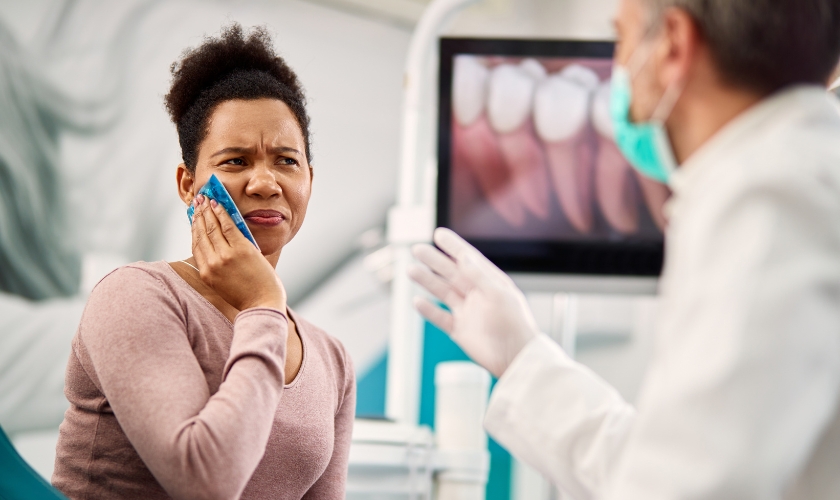We accept Medicare
What to Do in Case of Sudden Tooth Pain?

Experiencing sudden tooth pain can be an alarming and uncomfortable ordeal. Knowing how to address it promptly is essential to prevent further complications. Here’s a guide to help you navigate this typical dental emergency.
Understanding the Cause
Tooth pain can stem from various issues, including cavities, infections, gum disease, or trauma. Identifying the root cause is crucial for effective treatment. Common culprits include:
- Tooth Decay: When cavities form, they expose the tooth’s inner layers, causing sensitivity and pain.
- Gum Disease: Inflammation of the gums can lead to discomfort and aching teeth.
- Tooth Fracture: A cracked or broken tooth can cause sharp pain, especially when chewing.
- Abscess: A bacterial infection can create a pocket of pus, leading to severe pain and swelling.
- Impacted Teeth: Wisdom teeth or other teeth that don’t emerge properly can cause pressure and pain.
Understanding these potential causes helps in determining the best immediate response.
Immediate Relief Steps
When sudden tooth pain strikes, taking immediate action can provide temporary relief and prevent further damage. Here are some practical steps:
Rinse with Warm Salt Water
Saltwater rinses can reduce inflammation and clean the affected area. Mix a teaspoon of salt in a glass of warm water and swish it around your mouth for about 30 seconds. Repeat this process a few times a day.
Use Cold Compresses
Applying a cold compress to the outside of your cheek can numb the pain and reduce swelling. Wrap ice in a cloth and hold it against the affected area for 15-20 minutes. This can be repeated every few hours as needed.
Over-the-Counter Pain Relievers
Medications like ibuprofen or acetaminophen can alleviate pain and reduce inflammation. Always follow the recommended dosage instructions and avoid placing aspirin directly on the tooth or gums, as this can cause burns.
Avoid Certain Foods
Hot, cold, sugary, or acidic foods and drinks can exacerbate tooth pain. Stick to soft, room-temperature foods until you can see a dentist.
Dental Floss
If you suspect food particles are causing the pain, gently floss around the affected tooth. Be careful not to damage the gums further.
When to Seek Professional Help
While these immediate steps can provide temporary relief, professional dental care is essential for long-term resolution. Here’s when you should consult a dentist:
Persistent Pain
If the pain persists for more than a day or two, it’s crucial to seek professional help. Persistent tooth pain can indicate a more serious underlying issue that needs prompt treatment.
Swelling and Fever
Swelling, fever, or a foul taste in the mouth can signal an infection that requires immediate attention. An abscess, for example, can lead to severe complications if left untreated.
Broken or Knocked-Out Tooth
If your tooth is broken, cracked, or knocked out, seeing a dentist immediately increases the chances of saving the tooth. Store the tooth in milk or a tooth preservation product until you can visit the dentist.
Bleeding Gums
While occasional bleeding gums can be caused by aggressive brushing, consistent bleeding may indicate gum disease or another serious condition.
Preventing Future Tooth Pain
Preventive care is the best strategy to avoid sudden tooth pain and dental emergencies. Incorporating good oral hygiene practices and regular dental check-ups can make a significant difference. Here are some tips:
Regular Dental Check-Ups
Visit your dentist at least twice a year for routine cleanings and exams. Regular check-ups can catch potential issues early, preventing them from becoming painful emergencies.
Proper Brushing and Flossing
Brush your teeth at least twice a day with fluoride toothpaste and floss daily. Proper brushing and flossing techniques remove plaque and food particles, reducing the risk of cavities and gum disease.
Healthy Diet
Limit sugary and acidic foods and beverages that can erode tooth enamel and lead to cavities. Incorporate foods rich in calcium and other nutrients that support dental health.
Mouthguards
If you play sports or grind your teeth at night, using a mouthguard can protect your teeth from injury and wear.
Avoid Tobacco
Tobacco use can lead to gum disease, tooth decay, and oral cancer. Quitting tobacco can significantly improve your oral and overall health.
Home Remedies for Minor Tooth Pain
While waiting to see a dentist, certain home remedies can provide temporary relief from minor tooth pain. These remedies are not substitutes for professional care but can help manage discomfort.
Clove Oil
Clove oil has natural analgesic and antibacterial properties. Dab a small amount of clove oil on a cotton ball and apply it to the affected area. Be cautious not to swallow the oil.
Peppermint Tea Bags
Peppermint has a numbing effect that can provide temporary relief. After steeping a tea bag in hot water, let it cool slightly and apply it to the painful area.
Garlic
Garlic has natural antibacterial properties. Crush a garlic clove to create a paste and apply it to the affected tooth. This can help reduce pain and combat infection.
The Role of an Emergency Dentist
In situations where pain is severe or accompanied by other symptoms, an emergency dentist can provide the necessary care. Emergency dentists are equipped to handle urgent dental issues promptly, ensuring you get the necessary relief.
Quick Diagnosis and Treatment
An emergency dentist can quickly diagnose the cause of your tooth pain and provide appropriate treatment. This may include fillings, root canals, extractions, or antibiotics for infections.
After-Hours Care
Many dental practices offer after-hours care for emergencies, ensuring you have access to professional help even outside regular office hours.
Emergency Procedures
Emergency dentists can perform procedures to alleviate pain and address the root cause. These may include draining abscesses, performing emergency root canals, or addressing trauma-related injuries.
Ensuring Lasting Relief and Dental Health
Sudden tooth pain is a distressing experience, but knowing how to respond can make a significant difference. Immediate relief measures can provide temporary comfort, but seeking professional dental care is crucial for a lasting solution. By maintaining good oral hygiene and seeking regular check-ups, you can prevent many dental emergencies. Don’t hesitate to contact an emergency dentist if you experience severe or persistent pain, swelling, or other concerning symptoms. For those in Orlando, consulting an emergency dentist in Orlando ensures you receive prompt and effective care tailored to your needs.
Remember, taking care of your teeth prevents pain and contributes to your overall well-being. Stay proactive about your dental health, and you’ll be better equipped to handle any sudden tooth pain that comes your way.



